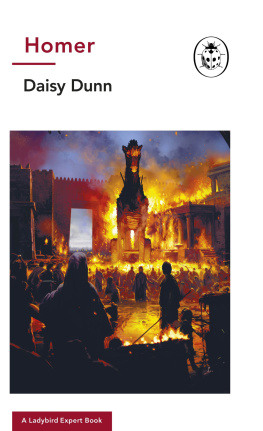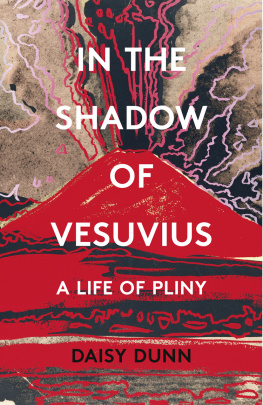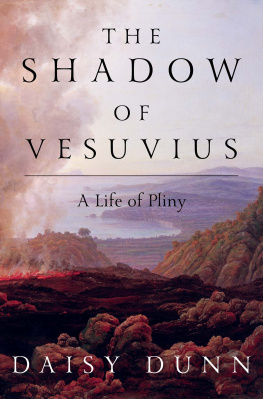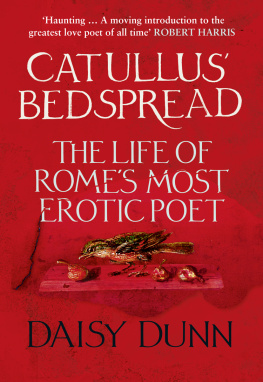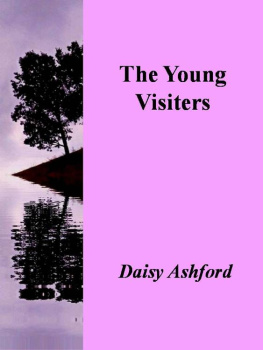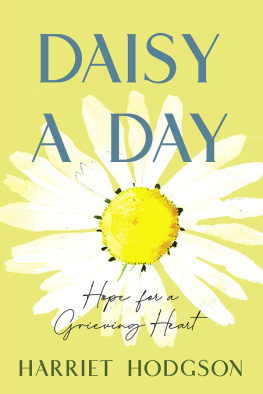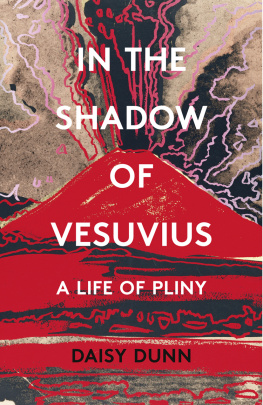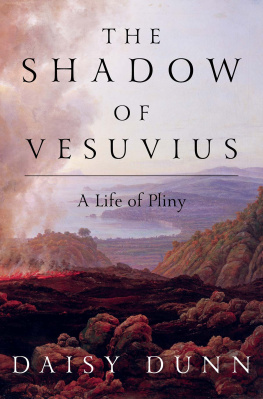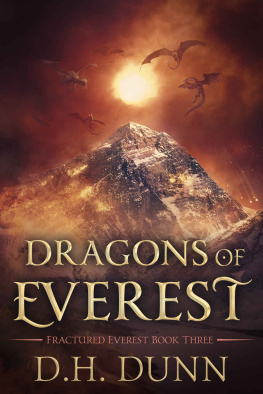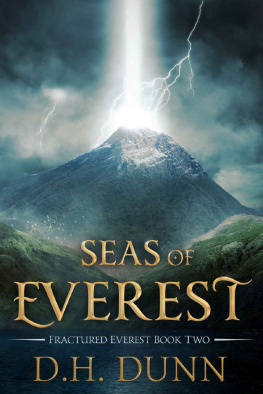Daisy Dunn - Homer
Here you can read online Daisy Dunn - Homer full text of the book (entire story) in english for free. Download pdf and epub, get meaning, cover and reviews about this ebook. year: 2019, publisher: Penguin Books Ltd, genre: Detective and thriller. Description of the work, (preface) as well as reviews are available. Best literature library LitArk.com created for fans of good reading and offers a wide selection of genres:
Romance novel
Science fiction
Adventure
Detective
Science
History
Home and family
Prose
Art
Politics
Computer
Non-fiction
Religion
Business
Children
Humor
Choose a favorite category and find really read worthwhile books. Enjoy immersion in the world of imagination, feel the emotions of the characters or learn something new for yourself, make an fascinating discovery.
- Book:Homer
- Author:
- Publisher:Penguin Books Ltd
- Genre:
- Year:2019
- Rating:3 / 5
- Favourites:Add to favourites
- Your mark:
- 60
- 1
- 2
- 3
- 4
- 5
Homer: summary, description and annotation
We offer to read an annotation, description, summary or preface (depends on what the author of the book "Homer" wrote himself). If you haven't found the necessary information about the book — write in the comments, we will try to find it.
Homer — read online for free the complete book (whole text) full work
Below is the text of the book, divided by pages. System saving the place of the last page read, allows you to conveniently read the book "Homer" online for free, without having to search again every time where you left off. Put a bookmark, and you can go to the page where you finished reading at any time.
Font size:
Interval:
Bookmark:
Achilles son of mortal Peleus and sea nymph Thetis
Agamemnon king of Mycenae, leader of the Greek army, brother of:
Menelaus king of Sparta, husband of Helen
Ajax son of Telamon
Diomedes son of Tydeus
Nestor king of Pylos
Odysseus king of Ithaca
Patroclus closest friend of Achilles
Phoenix former tutor of Achilles
Priam king of Troy
Hecuba his wife
Hector their son
Paris their son, lover of Helen
Andromache wife of Hector
Astyanax son of Hector
Sarpedon son of Zeus
Zeus king of the gods
Hera his wife
Athena goddess of wisdom and warfare
Aphrodite goddess of love
Apollo god of poetry and music
Ate blindness-inducing daughter of Zeus
Hephaestus craftsman god
Hermes messenger god
Poseidon god of the sea, father of the Cyclops Polyphemus
Every effort has been made to ensure images are correctly attributed, however, if any omission or error has been made please notify the Publisher for correction in future editions.
MICHAEL JOSEPH
UK | USA | Canada | Ireland | Australia
India | New Zealand | South Africa
Michael Joseph is part of the Penguin Random House group of companies whose addresses can be found at global.penguinrandomhouse.com.

First published 2019
Text copyright Daisy Dunn, 2019
All images copyright Ladybird Books Ltd, 2019
The moral right of the author has been asserted
Cover illustration by Angelo Rinaldi
ISBN: 978-1-405-93386-5
This ebook is copyright material and must not be copied, reproduced, transferred, distributed, leased, licensed or publicly performed or used in any way except as specifically permitted in writing by the publishers, as allowed under the terms and conditions under which it was purchased or as strictly permitted by applicable copyright law. Any unauthorized distribution or use of this text may be a direct infringement of the authors and publishers rights and those responsible may be liable in law accordingly.

Homers epics, the Iliad and the Odyssey, are two of the most influential works of literature in the world. Completed in Greek in the eighth or early seventh century BCE , they represent a milestone in the history of civilization but are above all exquisite stories, which can tell us as much about who we are and might become as about who we were.
The eighth century BCE was a time of great change in the Greek world. It saw the birth of the Olympic Games, the construction of the first temples to the gods, and the rediscovery of the art of writing with the invention of a new alphabet. The Greeks were beginning to travel widely overseas and establish settlements in places such as Sicily.
Homers epics reflect these new developments, despite being set some 400 years earlier, in the Late Bronze Age. But they also feel very ancient, because they contain traces of language and myths which predate them by generations. Homers first audiences would already have been familiar with a myth in which Paris, prince of Troy, judged Aphrodite, goddess of love, to be the most beautiful deity. As his reward, Paris ran away with Helen of Sparta. Her husband, Menelaus, and brother-in-law, Agamemnon, responded by leading a mighty Greek army against Troy (also known as Ilios or Ilion).
The Trojan War is Homers theme. The Iliad, the older of the two poems by perhaps forty years, describes over a month in the tenth and final year of the conflict. Its sequel, the Odyssey, follows the journey of Odysseus, the last man to return home. Together, the epics have reverberated down the centuries as tantalizing relics of a world half real, half imagined.
Homers identity is a mystery. Most people in antiquity believed that he was the author of both epics, but they had only theories about what he might have been like. The word homeros meant hostage in Greek, so some pictured Homer as a captive, but it could also mean blind. The idea of a blind bard was particularly attractive because the Odyssey features a blind poet named Demodocus.
Seven ancient cities claimed Homer for their own. Was he a man of Smyrna (Izmir in Turkey)? Did he come from Ios in the Cyclades, where he is said to be buried? Did he live on the rocky Aegean island of Chios? The Chian connection is perhaps the strongest. The location of Chios is described with great accuracy in the Odyssey, and rhapsodes calling themselves Homeridae (children of Homer) performed the poems on the island from as early as the sixth century BCE .
It is now considered highly likely that the poems originated on the west coast of Turkey or in the eastern Aegean. This region, known as Ionia, incorporated Chios and Smyrna. The language of Homers poems is broadly Ionic, but layered with archaisms and traces of dialects from other parts of the Greek world as well.
In 1897, the writer Samuel Butler argued that the Odyssey was authored by a woman. Scholars had long been debating whether a real Homer had even existed. While some did believe that each poem could only have been the product of a single mind, others suspected that the works took shape over time in the minds of several poets, or represented amalgamations of many earlier versions.
A breakthrough came in the twentieth century, when American scholar Milman Parry showed that there lay behind Homer an oral tradition. This meant that it was possible for the poetry, composed without writing, to be preserved by being memorized and recited, passed down from bard to bard.
Parry found evidence for this in the poems structure and song-like rhythm. Each line is a hexameter, formed of six sections, like the bars of a music score. Some bars contain a long sound followed by two short ones: dum di di. Others and almost always the last bar in each line consist of two long sounds: dum dum. The poet also repeats passages, as a singer would a chorus, and certain phrases, such as rose-fingered Dawn, unharvested sea and godlike Odysseus. As a bard performed the stories, he could hone them, incorporating stock phrases like these wherever he needed to fill a bar, adding new words while maintaining very old ones. Homers is consequently a Greek that no one ever spoke. Through both accident and design, it sounds older than it is, which is why deciphering its origins is so difficult.
There may still have been a Homer, a mastermind who shaped the inherited material into the complete Iliad, and perhaps a second Homer who did the same for the Odyssey. Both are coherent works of literature and must have been perfected when written down in the eighth or early seventh century BCE . Whether we prefer to think of Homer as a master editor or as a blind bard who first came up with the stories generations earlier, or as simply a label for the
Font size:
Interval:
Bookmark:
Similar books «Homer»
Look at similar books to Homer. We have selected literature similar in name and meaning in the hope of providing readers with more options to find new, interesting, not yet read works.
Discussion, reviews of the book Homer and just readers' own opinions. Leave your comments, write what you think about the work, its meaning or the main characters. Specify what exactly you liked and what you didn't like, and why you think so.

